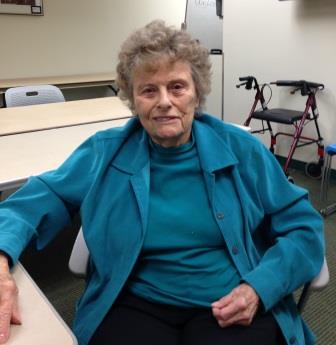 Simone Kent was on the first war bride ship that left for the United States in 1946.
Simone Kent was on the first war bride ship that left for the United States in 1946.
Leon, an American lieutenant stationed in Europe, reluctantly had volunteered to bring the records needed for a soldiers dance outside Paris. French-born Simone had come reluctantly to the dance with a friend and was dancing with a sergeant when Leon cut in.
They got engaged soon after, though neither remembers the marriage proposal. Simone says, “We were on the subway platform, and we weren’t engaged. Then we were on the subway, and we were. Neither of us remembers how it happened.”
Soon after their wedding, she boarded a ship with 800 other new brides. Leon picked her up in New York in “an old beat-up car” and the couple drove cross-country to Los Angeles, where Leon worked as an attorney. “I only have memories of the ice-cream parlors,” she says. “During the war, we didn’t have any food, so the food was very impressive to me when I got here.”
Simone had completed three years of medical school in France; she’d wanted to be a surgeon since she was three years old. “Not just a doctor, a surgeon. I’m not interested in pills; I’m interested in cutting.” Logistics conspired to keep her from completing her degree, so she devoted herself to caring for her children and animals.
While Simone hadn’t had any vision problems, her mother had cataracts, glaucoma and age-related macular degeneration (AMD); she was nearly blind when she died. “She loved when I brought my little Westie terrier to see her, because she could see the white of her fur and the black of her nose,” Simone says, adding that her mother’s AMD spurred her to have her own eyes checked regularly.
It wasn’t until she was about 75 that she first noticed a problem with her sight. “We had a gate on the garage, and the gate started to get wavy,” she recalls. “That’s when I knew I had macular degeneration.”
She managed quite well for about five years more, until one day in 2005, when she was driving to her regular market, and she couldn’t see any of the traffic lights. “Pow. All of a sudden, I couldn’t see them,” she recalls. “I took a chance making a left turn; I drove home and told my husband to drive me to the DMV to give back my license. I had just passed my driving test the week before, and they argued with me, because my license was good for four more years. I said, ‘No, I don’t want it! I’m telling you I’m not secure! I’m going to kill somebody. That’s it. Finished.”
In addition to driving, she has given up knitting, hand-sewing and reading. “Now I sit a lot, and I walk around. Mostly, I try not to bump into things,” she says with a characteristic laugh. “I educate the people around me to put things in the same place so I know where they are. Recently, someone moved my toothpaste, and I washed my teeth with cortisone 10.”
Today, Simone has wet AMD in both eyes. “My vision is going down. My right eye started with dry AMD, then eventually changed to wet,” she says. “My left eye is kaput. That eye had never had anything; I could see! It never had the dry; it went right to wet.”
Simone was referred to the Macular Degeneration Partnership by her ophthalmologist and began attending the monthly Beverly Hills Support Group [former support group hosted by DEF] in 2000. “It feels like a fraternity when you all have the same thing. But not everyone has the same attitude I do. I laugh a lot,” she says. “I’ve been trying to reach people in my building who have macular degeneration, but they won?t move from their seat. They would enjoy it, and we all could go in one car.”
Simone and Leon, who will celebrate 69 years of marriage in September, are also longtime donors to The Discovery Eye Foundation, *MDP’s parent organization. “It’s a wonderful organization,” Simone says. “DEF and MDP have been very helpful to me in every way.”
“The support group helps me a lot,” she says. “Judi [Delgado, former MDP executive director] is a fantastic source of information. We all love her. She keeps us informed about everything. I’m worried about my kids, my grandchildren, my great grandchildren. So I need to keep up to date for them and for me. I learn so much from Judi in the group. Doctors don’t have the time to tell you all the things Judi tells you.”
The nonagenarian, who is quite mobile with the help of her rolling walker, which she calls her “horse” has advice for others with AMD: Don’t get discouraged. The worst thing you can do is get depressed. Then you can’t think. You can find your own solutions, then with a support group, you can get a lot of other suggestions and try to apply them.”
Posted February 2014
*The Macular Degeneration Partnership became a program of the Gavin Herbert Eye Institute, UC Irvine in 2016.

